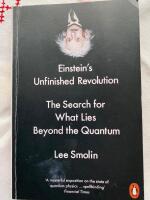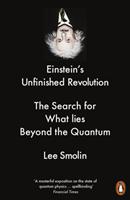
Einstein’s Unfinished Revolution
Pocketbok. Penguin Books Ltd. 2020. 322 sidor.
Nära nyskick.
Quantum mechanics is perhaps the most successful theory ever formulated. The only problem with it, argues Lee Smolin, is that it is wrong ... a fount of provocative ideas ... lucid, upbeat and, finally, optimistic' Graham Farmelo, Nature Human beings, says Lee Smolin, author of The Trouble With Physics, have always had a problem with the boundary between reality and fantasy, confusing our representations of the world with the world itself. Nowhere is this more evident than in quantum physics, which forms the basis for our understanding of everything from elementary particles to the behaviour of materials. While quantum mechanics is currently our best theory of nature at an atomic scale, it has many puzzling qualities - qualities that preclude realism and therefore give an incomplete description of nature. Rather than question this version of quantum mechanics, however, whole groups of physicists have embraced it as correct and rejected realism. Subscribing to a kind of magical thinking, they believe that what is real is far beyond the world we perceive: indeed, that the 'true' world is hidden from our perception. Back in the 1920s Einstein, both a realist and a physicist, believed that it was necessary to go beyond quantum mechanics to discover what was missing from a true theory of the atoms. This was Einstein's unfinished mission, and it is Lee Smolin's too. Not only will this new model of quantum physics form the basis of solutions to many of the outstanding problems of physics, but, crucially, it is a theory that is realist in nature. At a time when science is under attack, and with it the belief in a real world in which facts are either true or false, never has the importance of building science on the correct foundations been more urgent.
Förlagsfakta
- ISBN
- 9780141979168
- Titel
- Einstein’s Unfinished Revolution
- Författare
- Smolin, Lee
- Förlag
- Penguin Books Ltd.
- Utgivningsår
- 2020
- Omfång
- 322 sidor
- Bandtyp
- Mått
- 128 x 196 mm Ryggbredd 18 mm
- Vikt
- 260 g
- Språk
- English
- Baksidestext
- Human beings, says Lee Smolin, author of The Trouble With Physics, have always had a problem with the boundary between reality and fantasy, confusing our representations of the world with the world itself. Nowhere is this more evident than in quantum physics, which forms the basis for our understanding of everything from elementary particles to the behaviour of materials.While quantum mechanics is currently our best theory of nature at an atomic scale, it has many puzzling qualities - qualities that preclude realism and therefore give an incomplete description of nature. Rather than question this version of quantum mechanics, however, whole groups of physicists have embraced it as correct and rejected realism. Subscribing to a kind of magical thinking, they believe that what is real is far beyond the world we perceive: indeed, that the 'true' world is hidden from our perception.Back in the 1920s Einstein, both a realist and a physicist, believed that it was necessary to go beyond quantum mechanics to discover what was missing from a true theory of the atoms. This was Einstein's unfinished mission, and it is Lee Smolin's too.Not only will this new model of quantum physics form the basis of solutions to many of the outstanding problems of physics, but, crucially, it is a theory that is realist in nature. At a time when science is under attack, and with it the belief in a real world in which facts are either true or false, never has the importance of building science on the correct foundations been more urgent.

